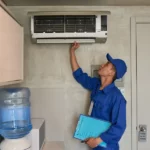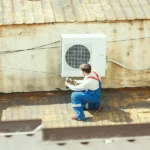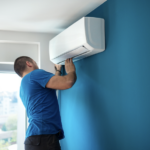Allergies can be a real nuisance. They can make you feel miserable and disrupt your daily life. But did you know that your AC unit does have the ability to help curb allergies? Let’s explore how.
Debunking the Myth: Does Air Conditioning Help with Allergies?
Yes, air conditioners do help with allergies. Your HVAC unit can definitely keep you cool, but it can also significantly improve indoor air quality. It filters out common allergens such as dust, pollen, pet dander, and mold spores. The cooling process of an air conditioner naturally removes moisture from the air, which helps to reduce humidity levels and prevent the growth of mold and mildew, both of which are common allergens.
However, it’s important to maintain your HVAC system properly to ensure it continues to help with allergies. Regular maintenance, such as changing filters, cleaning ductwork, and ensuring the unit is free from mold and mildew, will go a long way in keeping your allergies at bay.
How Your HVAC Unit Can Remove Allergens
- Regular Maintenance
Change the filters often to ensure your HVAC system is working efficiently. Clean filters mean cleaner air, which helps reduce allergens like dust and pollen. Regular maintenance can also prevent the buildup of mold and mildew in your system.
- Humidity Control
Use your HVAC unit to maintain a comfortable humidity level. Too much humidity can lead to mold growth, which is a common allergen. Keeping humidity in check can make your home less hospitable to mold and dust mites.
- Air Purifiers and UV Lights
Consider adding air purifiers or UV lights to your HVAC system. These can kill bacteria and mold spores, further improving the air quality. They can capture even the smallest particles, making the air you breathe cleaner and healthier.
- Keep Windows Closed
When your air conditioner is running, keep your windows closed. This prevents outdoor allergens like pollen from entering your home. It allows your HVAC system to work more effectively in filtering and cooling the indoor air.
- Duct Cleaning
Regularly clean your ductwork to reduce the amount of allergens circulating in your home. Dust, pet dander, and other particles can accumulate in the ducts, so keeping them clean ensures better air quality.
- Use High-Efficiency Filters
Opt for HEPA filters to trap smaller particles standard filters might miss. These filters can capture up to 99.97% of airborne particles, making a significant difference for allergy sufferers.
- Regularly Clean Your Home
Dust and vacuum frequently to reduce allergens in your living space. Even the best HVAC system can’t do it all, so regular cleaning helps keep the air as allergen-free as possible.
- Stay on Top of Repairs
Ensure your HVAC unit is in good working order with regular inspections and timely repairs. A well-functioning system is essential for maintaining good air quality and effectively filtering out allergens.
Proven Tips to Maximize Your AC’s Efficiency
Keeping your air conditioning unit running efficiently is crucial for maintaining a comfortable indoor environment while minimizing energy costs. Not only that, it can also help reduce allergens, making your home a healthier and more pleasant place to live.
So how can you make your air conditioning unit more efficient?
- Schedule Regular Maintenance: Regular maintenance on your AC does have significant benefits, including ensuring your air conditioner helps with your allergies and performs at its peak. Schedule annual tune-ups with a professional HVAC technician to help clean and inspect the system, replace filters, and address any issues.
- Upgrade to a High-Efficiency Unit: If your AC unit is more than 10 years old, consider upgrading to a newer, high-efficiency model. Modern units are designed to be more energy-efficient, saving you money on utility bills while providing better cooling performance.
- Seal Air Leaks: Caulk and weather-strip around windows, doors, and any other openings to prevent cool air from escaping and warm air from entering. This can reduce the workload on your AC unit and improve its efficiency.
- Clean or Replace Air Filters: Dirty air filters can restrict airflow and force your AC unit to work harder, reducing its efficiency. Clean or replace filters regularly, following the manufacturer’s recommendations.
- Ensure Proper Airflow: Remove any obstructions around the indoor and outdoor units to ensure proper airflow. Trim back any vegetation or clear away debris that could block the airflow.
Use Ceiling Fans: Ceiling fans can help circulate cool air more effectively, allowing you to raise the thermostat a few degrees without sacrificing comfort. This can reduce the workload on your AC unit and save energy.
You Don’t Have to Do It On Your Own
Does air conditioning help with allergies? Yes, but you have to stay on top of maintaining a smooth operating unit. The good news is that there is a team of HVAC experts in Westminster, CO who can help ensure your unit works in tip-top condition.
Looking to enhance your HVAC system in Westminster, CO to alleviate allergies? Reach out to us today to book a consultation or service appointment.






